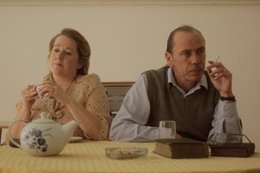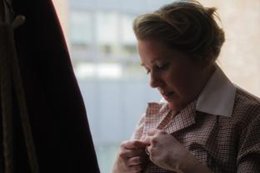One of the remarkable things about the Bewley’s Café Theatre is that it is both un-theatrical and yet highly theatrical simultaneously. There is very little mystique as you sit in the room, eating (very good) soup and bread, listening to the noises from Grafton street, looking around at the fellow patrons in the dim light from the chinks between the curtains, the clatter of china a companionable sound in the tearooms below. The space is limited, so that the stage is a raised dais across one corner, fitting a couple of actors, two chairs, a table and a coat stand. There aren’t any footlights and the actors are close enough to touch, which you’d think would dispel the illusion of, well, illusion. And yet the theatrical contract of suspending disbelief remains unchallenged, we do believe in the illusion. Perhaps because of the intimacy and the permeability of the space, we are primed to accept what illusion there is, to go with the actors. And in the case of A Galway Girl that’s made easy for us by the skill of the actors Clare Barrett and Joe Hanley, whose emotional and financial hardships we only too willingly invest in, caring about the characters as if they were indeed real.
And in the case of A Galway Girl that’s made easy for us by the skill of the actors Clare Barrett and Joe Hanley, whose emotional and financial hardships we only too willingly invest in, caring about the characters as if they were indeed real.
The play takes us through the stages of a marriage, from early disillusion to late acceptance. We are initially inclined to side with the honest to goodness working-class Dermot, as he decries the airs and graces of the upwardly mobile Maisie, who mediates her entire understanding of life through the prism of the neighbours’ opinion. That is, until Dermot shows his nature as a violent bully. While it is possible by the end of the play to sympathise with Dermot’s inability to connect with his family or others in a meaningful way, it is Maisie who deserves the real sympathy. Maisie who, like so many women of her generation, never has the option of not coping, of walking away. Her strength of character and resolve makes her a character worthy of admiration, even while we hope that this kind of ‘for worse’ marriage is a thing of the past.
Geraldine Aron’s script is a masterclass in the economy of time and scale, evoking a lifetime of coexistence through the monologues of husband and wife. Joe Hanley is direct and gruff, with moments of sentimentality, and brings the character of Dermot to life, where it might have been easy for Hanley and director Terry Byrne to make of him a monster.  Clare Barrett more than holds her own on the other side of the table, and has that rare ability of tone and timing to emote without overdoing it. (There are shades here, too, of her character in I Heart Alice Heart I, in the shy yet appealing character, and the instant rapport between audience and actress.) Both Hanley and Barrett modulate their voices and gestures to capture the personalities of these two characters, and the depiction of ageing is well judged. The lighting by Colm Maher, period set by Kate Moylan and sound together create an intimate context for the two actors.
Clare Barrett more than holds her own on the other side of the table, and has that rare ability of tone and timing to emote without overdoing it. (There are shades here, too, of her character in I Heart Alice Heart I, in the shy yet appealing character, and the instant rapport between audience and actress.) Both Hanley and Barrett modulate their voices and gestures to capture the personalities of these two characters, and the depiction of ageing is well judged. The lighting by Colm Maher, period set by Kate Moylan and sound together create an intimate context for the two actors.
Overall, though the time is brief, the staging minimal and the context bustling, the magic of theatre is alive and well. This is a really good lunchtime show so I hope it plays to full tables. And the soup is good too.
Emilie Pine lectures in University College Dublin.